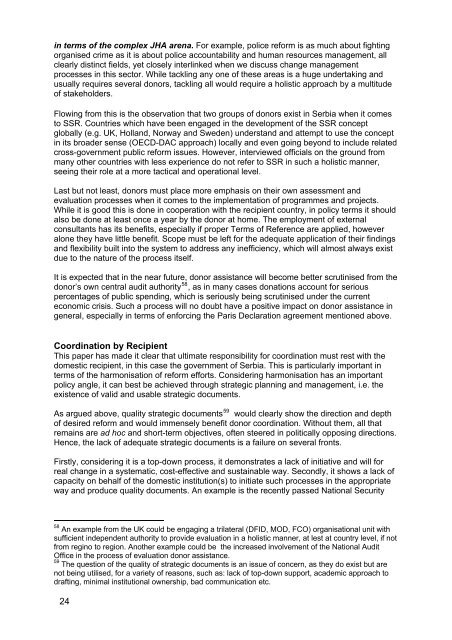Security Sector Reform and Donor Assistance in Serbia - Defence ...
Security Sector Reform and Donor Assistance in Serbia - Defence ...
Security Sector Reform and Donor Assistance in Serbia - Defence ...
You also want an ePaper? Increase the reach of your titles
YUMPU automatically turns print PDFs into web optimized ePapers that Google loves.
<strong>in</strong> terms of the complex JHA arena. For example, police reform is as much about fight<strong>in</strong>gorganised crime as it is about police accountability <strong>and</strong> human resources management, allclearly dist<strong>in</strong>ct fields, yet closely <strong>in</strong>terl<strong>in</strong>ked when we discuss change managementprocesses <strong>in</strong> this sector. While tackl<strong>in</strong>g any one of these areas is a huge undertak<strong>in</strong>g <strong>and</strong>usually requires several donors, tackl<strong>in</strong>g all would require a holistic approach by a multitudeof stakeholders.Flow<strong>in</strong>g from this is the observation that two groups of donors exist <strong>in</strong> <strong>Serbia</strong> when it comesto SSR. Countries which have been engaged <strong>in</strong> the development of the SSR conceptglobally (e.g. UK, Holl<strong>and</strong>, Norway <strong>and</strong> Sweden) underst<strong>and</strong> <strong>and</strong> attempt to use the concept<strong>in</strong> its broader sense (OECD-DAC approach) locally <strong>and</strong> even go<strong>in</strong>g beyond to <strong>in</strong>clude relatedcross-government public reform issues. However, <strong>in</strong>terviewed officials on the ground frommany other countries with less experience do not refer to SSR <strong>in</strong> such a holistic manner,see<strong>in</strong>g their role at a more tactical <strong>and</strong> operational level.Last but not least, donors must place more emphasis on their own assessment <strong>and</strong>evaluation processes when it comes to the implementation of programmes <strong>and</strong> projects.While it is good this is done <strong>in</strong> cooperation with the recipient country, <strong>in</strong> policy terms it shouldalso be done at least once a year by the donor at home. The employment of externalconsultants has its benefits, especially if proper Terms of Reference are applied, howeveralone they have little benefit. Scope must be left for the adequate application of their f<strong>in</strong>d<strong>in</strong>gs<strong>and</strong> flexibility built <strong>in</strong>to the system to address any <strong>in</strong>efficiency, which will almost always existdue to the nature of the process itself.It is expected that <strong>in</strong> the near future, donor assistance will become better scrut<strong>in</strong>ised from thedonor’s own central audit authority 58 , as <strong>in</strong> many cases donations account for seriouspercentages of public spend<strong>in</strong>g, which is seriously be<strong>in</strong>g scrut<strong>in</strong>ised under the currenteconomic crisis. Such a process will no doubt have a positive impact on donor assistance <strong>in</strong>general, especially <strong>in</strong> terms of enforc<strong>in</strong>g the Paris Declaration agreement mentioned above.Coord<strong>in</strong>ation by RecipientThis paper has made it clear that ultimate responsibility for coord<strong>in</strong>ation must rest with thedomestic recipient, <strong>in</strong> this case the government of <strong>Serbia</strong>. This is particularly important <strong>in</strong>terms of the harmonisation of reform efforts. Consider<strong>in</strong>g harmonisation has an importantpolicy angle, it can best be achieved through strategic plann<strong>in</strong>g <strong>and</strong> management, i.e. theexistence of valid <strong>and</strong> usable strategic documents.As argued above, quality strategic documents 59 would clearly show the direction <strong>and</strong> depthof desired reform <strong>and</strong> would immensely benefit donor coord<strong>in</strong>ation. Without them, all thatrema<strong>in</strong>s are ad hoc <strong>and</strong> short-term objectives, often steered <strong>in</strong> politically oppos<strong>in</strong>g directions.Hence, the lack of adequate strategic documents is a failure on several fronts.Firstly, consider<strong>in</strong>g it is a top-down process, it demonstrates a lack of <strong>in</strong>itiative <strong>and</strong> will forreal change <strong>in</strong> a systematic, cost-effective <strong>and</strong> susta<strong>in</strong>able way. Secondly, it shows a lack ofcapacity on behalf of the domestic <strong>in</strong>stitution(s) to <strong>in</strong>itiate such processes <strong>in</strong> the appropriateway <strong>and</strong> produce quality documents. An example is the recently passed National <strong>Security</strong>58 An example from the UK could be engag<strong>in</strong>g a trilateral (DFID, MOD, FCO) organisational unit withsufficient <strong>in</strong>dependent authority to provide evaluation <strong>in</strong> a holistic manner, at lest at country level, if notfrom reg<strong>in</strong>o to region. Another example could be the <strong>in</strong>creased <strong>in</strong>volvement of the National AuditOffice <strong>in</strong> the process of evaluation donor assistance.59 The question of the quality of strategic documents is an issue of concern, as they do exist but arenot be<strong>in</strong>g utilised, for a variety of reasons, such as: lack of top-down support, academic approach todraft<strong>in</strong>g, m<strong>in</strong>imal <strong>in</strong>stitutional ownership, bad communication etc.24
















